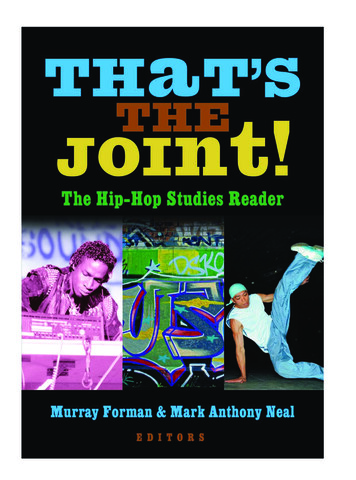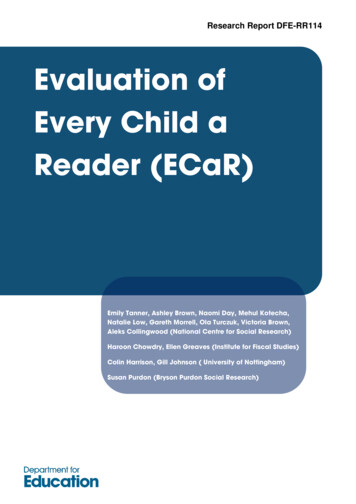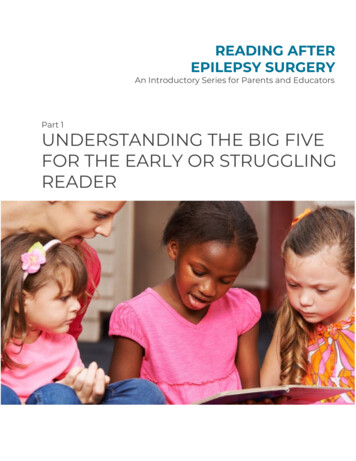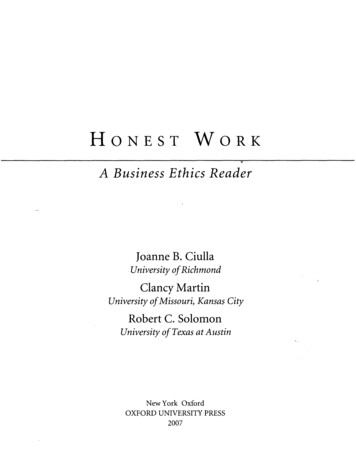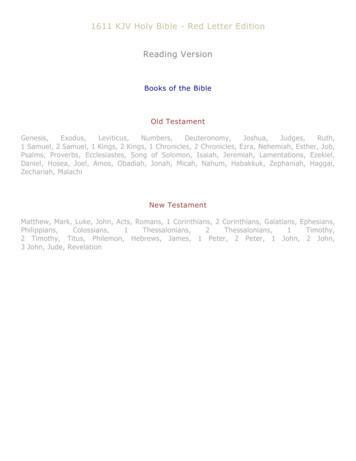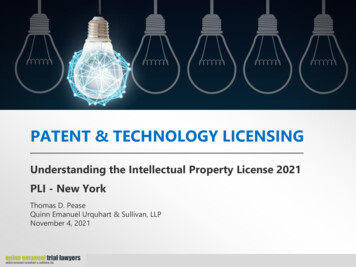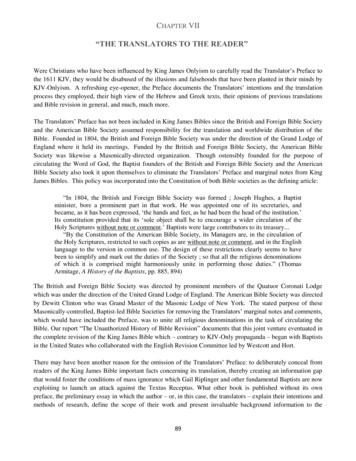
Transcription
CHAPTER VII“THE TRANSLATORS TO THE READER”Were Christians who have been influenced by King James Onlyism to carefully read the Translator‘s Preface tothe 1611 KJV, they would be disabused of the illusions and falsehoods that have been planted in their minds byKJV-Onlyism. A refreshing eye-opener, the Preface documents the Translators‘ intentions and the translationprocess they employed, their high view of the Hebrew and Greek texts, their opinions of previous translationsand Bible revision in general, and much, much more.The Translators‘ Preface has not been included in King James Bibles since the British and Foreign Bible Societyand the American Bible Society assumed responsibility for the translation and worldwide distribution of theBible. Founded in 1804, the British and Foreign Bible Society was under the direction of the Grand Lodge ofEngland where it held its meetings. Funded by the British and Foreign Bible Society, the American BibleSociety was likewise a Masonically-directed organization. Though ostensibly founded for the purpose ofcirculating the Word of God, the Baptist founders of the British and Foreign Bible Society and the AmericanBible Society also took it upon themselves to eliminate the Translators‘ Preface and marginal notes from KingJames Bibles. This policy was incorporated into the Constitution of both Bible societies as the defining article:―In 1804, the British and Foreign Bible Society was formed ; Joseph Hughes, a Baptistminister, bore a prominent part in that work. He was appointed one of its secretaries, andbecame, as it has been expressed, ‗the hands and feet, as he had been the head of the institution.‘Its constitution provided that its ‗sole object shall be to encourage a wider circulation of theHoly Scriptures without note or comment.‘ Baptists were large contributors to its treasury.―By the Constitution of the American Bible Society, its Managers are, in the circulation ofthe Holy Scriptures, restricted to such copies as are without note or comment, and in the Englishlanguage to the version in common use. The design of these restrictions clearly seems to havebeen to simplify and mark out the duties of the Society ; so that all the religious denominationsof which it is comprised might harmoniously unite in performing those duties.‖ (ThomasArmitage, A History of the Baptists, pp. 885, 894)The British and Foreign Bible Society was directed by prominent members of the Quatuor Coronati Lodgewhich was under the direction of the United Grand Lodge of England. The American Bible Society was directedby Dewitt Clinton who was Grand Master of the Masonic Lodge of New York. The stated purpose of theseMasonically-controlled, Baptist-led Bible Societies for removing the Translators‘ marginal notes and comments,which would have included the Preface, was to unite all religious denominations in the task of circulating theBible. Our report ―The Unauthorized History of Bible Revision‖ documents that this joint venture eventuated inthe complete revision of the King James Bible which – contrary to KJV-Only propaganda – began with Baptistsin the United States who collaborated with the English Revision Committee led by Westcott and Hort.There may have been another reason for the omission of the Translators‘ Preface: to deliberately conceal fromreaders of the King James Bible important facts concerning its translation, thereby creating an information gapthat would foster the conditions of mass ignorance which Gail Riplinger and other fundamental Baptists are nowexploiting to launch an attack against the Textus Receptus. What other book is published without its ownpreface, the preliminary essay in which the author – or, in this case, the translators – explain their intentions andmethods of research, define the scope of their work and present invaluable background information to the89
reader, in order to avoid misunderstanding and misrepresentation of the work? Of this travesty – the omissionof the Translators‘ Preface from the King James Bible – the late manuscript scholar, E.J. Goodspeed, wrote:―But it is the omission of the great Preface, ‗The Translators to the Reader,‘ that is most to beregretted. The makers of the version in their day felt that the work called for some explanationand defense, and entrusted the writing of a suitable preface to Myles Smith, of Brasenose College,Oxford, afterward Bishop of Gloucester. His Preface for many years stood at the beginning of theversion. But for various reasons – its length, its obscurity, its controversial and academiccharacter – it has gradually come to be omitted by modern publishers of the King James, which isthus made to present itself to the reader abruptly and without explanation or introduction of anykind.―The result of this upon the hosts of ignorant and untrained people who use the version isdisastrous in the extreme. My own correspondence abounds in letters from well-meaning peoplewho have been led into the strangest misconceptions by its absence. It is indeed long,controversial, and pedantic, but this very fact is significant. And with all its faults, it says somethings about the version and its makers and their aims that still greatly need to be said, indeed,that must be said, if the readers of the version are to be given the protection and guidance thatthey deserve and that its makers provided for them.―For they will accept this guidance and protection from no one else. It is idle for any modernto attempt to correct these misapprehensions; his efforts will only be resented or ignored. But ifthe King James Bible itself can be shown to say to its adherents the very things they most need toknow about their version, it will be possible for them to benefit by them without embarrassmentor inconsistency. All the more necessary, it would seem, for restoring the great Preface, or at leastthe essential parts of it, to its rightful place in the ‗Authorized Bible.‘.―That that edition should continue to sink into greater and greater misconception andmisrepresentation, when much of it might be prevented by the simple and obvious device ofrestoring the Preface, is intolerable. That version is too deeply freighted with religious values tobe left at the mercy of every charlatan to exploit. Its Preface is a great monument of soundbiblical learning and method. Its readers need it as they have never needed it before. It lies readyto our hands, enfolding in itself the very correctives modern vagaries about the King James Bibleso sadly need.‖ (―Thesis on the Translators‘ Preface‖)We are left to wonder why it has been left to a modern scholar to publish this compelling and righteous protestof the removal of the Translators‘ Preface from the King James Version. Why is it that a modern scholarendeavored for years to restore the Translators‘ Preface to the King James Version, but among the multitude ofKJV-Only advocates who only claim to defend the KJV, not one has (to our knowledge) ever registered acomplaint about the removal of the Preface and demanded its restoration by the publishing houses and Biblesocieties. Nor have any of them independently published King James Bibles which include the Preface. Nor dothe so-called defenders of the 1611 King James Version educate their readers as to the contents of theTranslators‘ Preface; nor do they post it on their websites. Nor do they cite the Translators‘ own words in theirdefense of the KJV, but instead invent dishonest explanations concerning the various translation issues, such asthe Translators‘ choice of ―Easter‖ instead of ―Passover‖ in Acts 12:4, which is forthrightly explained in theTranslators‘ Preface.We submit that inclusion of the Translators‘ Preface in King James Bibles would provide KJV readers with thefacts concerning the translation of the 1611 Authorised Version – facts that, as stated by E.J. Goodspeed, wouldenlighten and protect them against the great quantity of false and misleading information that has issued forth90
from the leadership of the KJV-Only movement. It is for this reason that we recommend Professor Edgar J.Goodspeed‘s ―Thesis on the Translators‘ Preface‖ – not as an endorsement of modern scholarship – but toinform our readers and create awareness of what we believe has been the deliberate suppression of the Preface tothe 1611 King James Version.The Translators made numerous statements that would expose the heresy of Ruckmanisim, if only their Prefacewere made more available to Christians. As for complete quotations from the Translators‘ Preface, it‘s slimpickins in KJV-Only publications. Gail Riplinger ought to have included the Preface in her book and posted iton her website, but no, the reader must request it from her organization. This offer is found in small print inChapter 15 of In Awe of Thy Word:―Four primary records, some recently discovered, document the thoughts of the KJV translators:1. The Annotated Bishop's Bible . held in the Bodleian Library in England, catalogued as ‗Bib.Eng. b.I.‘.2. Manuscript 98: A trial translation of the Epistles (1607-1608) by the Westminster committee.3. The handwritten English, Latin and Greek notes of KJV translator John Bois, showing thefinal work on the Epistles and Revelation.4. The Translators to the Reader: Preface to the King James Bible, by Miles Smith (available atA.V. Publications)‖ (In Awe of Thy Word, p. 524)Instead of including the Translators‘ Preface in her book, a chapter is devoted to ―Manuscript 98, the AnnotatedBishop‘s Bible, and the handwritten notes from the decisive and final translation committee meeting.‖ (Awe, p.31) Instead of the Translators‘ Preface presented for all to read, the reader is given minutiae about various KJVreadings and selected information about the life of John Bois from Ward Allen‘s translation of the ―HiddenHandwritten Notes of John Bois‖ which ―had been lost but a copy of them was recently discovered for ourgeneration. They are catalogued as MS C.C.C. 312 in the Fulman Collection of Corpus Christi College Library,Oxford University.‖ (Awe, p. 532) These virtually inaccessible source documents, along with the Translators‘Preface, which the reader can obtain by special request from AV Publications, ―document the thoughts of theKJV translators.‖ (Awe, p. 524)How many readers of In Awe of Thy Word have actually contacted AV Publications for a copy of theTranslators‘ Preface? Gail could easily have directed her readers to one of many websites which post theTranslators‘ Preface, or simply suggested they type ―The Translators to the Reader‖ into any search engine,which brings up scores of websites. No need to travel to Oxford University for this source document, whichshould be available on Gail‘s website, AV Publications, as well as in her books. Making the Translators‘Preface difficult to obtain reminded us of the Translators‘ complaint that the Roman Catholic Church suppressedthe Scriptures by obstructing the path to them:THE UNWILLINGNESS OF OUR CHIEF ADVERSARIES, THAT THE SCRIPTURESSHOULD BE DIVULGED IN THE MOTHER TONGUE, ETC.―Now the Church of Rome would seem at the length to bear a motherly affection towards herchildren, and to allow them the Scriptures in their mother tongue: but indeed it is a gift, notdeserving to be called a gift, an unprofitable gift:. they must first get a licence in writing beforethey may use them, and to get that, they must approve themselves to their Confessor, that is, tobe such as are, if not frozen in the dregs, yet soured with the leaven of their superstition. So91
much are they afraid of the light of the Scripture,.that they will not trust the people with it, nonot as it is set forth by their own sworn men, no not with the Licence of their own Bishops andInquisitors. Yea, so unwilling they are to communicate the Scriptures to the people‘sunderstanding in any sort, that they are not ashamed to confess, that we forced them to translateit into English against their wills. This seemeth to argue a bad cause, or a bad conscience, orboth.‖ (―The Translators to the Reader‖)ABOUT ROMAN CATHOLICISMThe Translators had many things to say about the Roman Catholic Church, most of them uncomplimentary.However, many will be surprised to learn that the Translators considered the Roman Catholic Church to havebeen a ―true Church‖ in the early centuries of its existence. The Translators thought well of St. Gregory ofNazianzus (325-389 A.D.), the Catholic theologian who contended against the Arians and Apollinarians at theFirst Council of Constantinople in 381 A.D. The Translators also likened those who criticized King James‘funding of the Church of England to those who criticized the Roman Emperor Constantine‘s liberal endowmentof the Catholic clergy.THE BEST THINGS HAVE BEEN CALUMNIATED―And fourthly, that he was no babe, but a great clerk [Gregory the Divine], that gave forth (andin writing to remain to posterity) in passion peradventure, but yet he gave forth, that he had notseen any profit to come by any Synod, or meeting of the Clergy, but rather the contrary; Andlastly, against Church-maintenance and allowance, in such sort, as the Ambassadors andmessengers of the great King of Kings should be furnished, it is not unknown what a fiction orfable (so it is esteemed, and for no better by the reporter himself [Nauclerus], thoughsuperstitious) was devised; Namely, that at such a time as the professors and teachers ofChristianity in the Church of Rome, then a true Church, were liberally endowed, a voiceforsooth was heard from heaven, saying: Now is poison poured down into the Church, etc. Thusnot only as oft as we speak, as one saith, but also as oft as we do anything of note orconsequence, we subject ourselves to everyone‘s censure, and happy is he that is least tossedupon tongues; for utterly to escape the snatch of them it is impossible.‖ (―The Translators to theReader‖)The Translators were referring to a statement made in 1500 A.D. by John Nanclerus who was the president ofthe University of Tubingen, that bastion of theological liberalism in Germany, where Luther launched theReformation soon afterward. This identification was made by Thomas Fuller in his Church History of Britain,wherein he also praised Constantine the Great for ending the persecution of Christians and bestowing materialbenefits on the Church.20. Peace and Prosperity restored to the Church by Constantine. A.D.3I2.―Constantine being now peaceably settled in the imperial throne, there followed a sudden andgeneral alteration in the world; persecutors turning patrons of religion. O the efficacy of a godlyemperor's example, which did draw many to a conscientious love of Christianity, and did drivemore to a civil conformity thereunto ! The Gospel, formerly a forester, now became a citizen ;and leaving the woods wherein it wandered, hills and holes where it hid itself before, dweltquietly in populous places. The stumps of ruined churches, lately destroyed by Diocletian, grew92
up into beautiful buildings; oratories were furnished with pious ministers, and they provided ofplentiful maintenance, through the liberality of Constantine. And if it be true, what one relates,that about this tune, when the church began to be enriched with means, there came a voice fromheaven, (I dare boldly say, he that first wrote it never heard it, being a modern author,)* saying,‗Now is poison poured down into the church; yet is there no danger of death thereby, seeinglately so strong an antidote hath been given against it.‘ Nor do we meet with any particularbounty conferred by Constantine, or Helen his mother, on Britain, their native country,otherwise than as it shared now in the general happiness of all Christendom fn. John Nanclerus, president of Tubing University, anno 1500.‖ (Thomas Fuller, D.D., TheChurch History of Britain from the Birth of Jesus Christ to the Year MDCXLVIII, Vol. I,London, 1837)Apparently the first Holy Roman Emperor, whose largesse toward the Church deserved praise, was met withcalumny instead, according to the Translators:THE BEST THINGS HAVE BEEN CALUMNIATED―So the first Christened Emperor [Constantine] (at the least-wise that openly professed thefaith himself, and allowed others to do the like) for strengthening the Empire at his greatcharges, and providing for the Church, as he did, got for his labour the name Pupillus, as whowould say, a wasteful Prince, that had need of a Guardian or overseer [Aurel. Victor].‖ (―TheTranslators to the Reader‖)The Translators likened Constantine the Great to King James I and cited Eusebius‘ Life of Constantine asevidence of his Christian character:HIS MAJESTY'S CONSTANCY, NOTWITHSTANDING CALUMNIATION, FOR THESURVEY OF THE ENGLISH TRANSLATIONS―It doth certainly belong unto Kings, yea, it doth specially belong unto them, to have care ofReligion, yea, to know it aright, yea, to profess it zealously, yea to promote it to the uttermost oftheir power. This is their glory before all nations which mean well, and this will bring unto thema far most excellent weight of glory in the day of the Lord Jesus. For the Scripture saith not invain, ‗Them that honor me, I will honor,‘ [1 Sam 2:30] neither was it a vain word that Eusebiusdelivered long ago, that piety towards God was the weapon and the only weapon, that bothpreserved Constantine‘s person, and avenged him of his enemies [Eusebius lib 10 cap 8].‖(―The Translators to the Reader‖)Gail Riplinger and other KJV-Only advocates (who tell us what the 1611 AV Translators believed whilesuppressing their Preface in which they wrote what they believed), present a view of Constantine and Eusebiusthat fully contradicts that of the Translators. The KJV-Only version portrays Constantine and Eusebius aswolves in sheep‘s clothing who conspired to synthesize Christianity and paganism.―The Western roots of the New World Religion of the false prophet can be found in thephilosophies of Egypt, Greece and Rome.the Rome of Constantine and Eusebius, with their93
merger of Christianity and paganism, cradled the infantile crossbreed which today is Satan‘sseasoned scarlet woman. (Revelation 18).―Historians, such as the author of The Spear of Destiny, record that the ruler who possessesthe spear that pierced Christ‘s side, including forty-five men from Constantine to Adolf Hitler,will have occultic sovereignty.‖ (New Age Bible Versions, pp. 516, 535)Gail dignifies Trevor Ravenscroft‘s Spear of Destiny as history even though the material for the book was basedon the visions and astral travels of an occultist, a Dr. Walter Johannes Stein, who practiced ―the ancientRosicrucian meditation on the Black Cross and Seven Roses which embraced the inner significance of theBlood, the central theme of the search for the Grail.‖ (The Spear of Destiny, p. 192) Are we to believe thestatement of a fellow occultist of Trevor Ravenscroft or the KJV Translators, whose favorable opinion ofConstantine, Eusebius and the early Roman Church Gail Riplinger omitted in her section on the ―Public Viewsof the King James Translators: Rome‖? (Awe, pp. 535-6)The Translators‘ source, Eusebius of Caesarea‘s The Life of the Blessed Emperor Constantine,, was achronology of Constantine‘s labors to establish the Christian Church and to eradicate paganism throughout theRoman Empire. Socrates Scholasticus‘ Ecclesiastical History is a respected historical account of the Council ofNicea and the role of Constantine and Eusebius of Caesarea in bringing the bishops to agreement concerning theArian controversy. Convened and led by Constantine, the Council established as Christian doctrine the deity ofJesus Christ as it was set forth in the Nicene Creed. The King James Translators‘ knowledge of Roman historyderived from accepted historical records such as these.In New Age Bible Versions, Gail did the usual hatchet job on her source, Eusebius‘ ―Oration in Praise ofConstantine‖, which was not identified lest readers discover her misquote:―Eusebius, like the false prophet of the book of Revelations and Daniel, ‗magnifies‘Constantine, proclaiming that his power came from a supernatural source. Constantine was, hesays, ‗.interpreter to the Word of God.invested as he is with heavenly sovereignty.whosecharacter is formed after the Divine original. Hence is our emperor perfect. 74.‖ fn. 74.What Ever Happened to Heaven?, p. 115‖ 6. (New Age Bible Versions, pp. 535, 685)As stated, the original source for this quotation was Eusebius‘ ―Oration in Praise of Constantine.‖ Notice themany words which Gail omitted (Westcott-Hort style, ) in order to misrepresent Eusebius:―He who is the pre-existent Word, the Preserver of all things, imparts to his disciples theseeds of true wisdom and salvation, and at once enlightens and gives them understanding in theknowledge of his Father‘s kingdom. Our emperor, his friend, acting as interpreter to theWord of God, aims at recalling the whole human race to the knowledge of God; proclaimingclearly in the ears of all, and declaring with powerful voice the laws of truth and godliness to allwho dwell on the earth.―Lastly, invested as he is with a semblance of heavenly sovereignty, he directs his gazeabove, and frames his earthly government according to the pattern of that Divine original,feeling strength in its conformity to the monarchy of God.―He is indeed an emperor, and bears a title corresponding to his deeds; a Victor in truth, whohas gained the victory over those passions which overmaster the rest of men: whose characteris formed after the Divine original of the Supreme Sovereign, and whose mind reflects, as in94
a mirror, the radiance of his virtues. Hence is our emperor perfect in discretion, in goodness,in justice, in courage, in piety, in devotion to God.‖In New Age Bible Versions, Gail misrepresented Constantine as condoning the Arian heresy while in her otherbook, In Awe of Thy Word, she portrayed Ulphilas, the Arian missionary responsible for spreading Arianismthroughout the Roman Empire, as a Bible-believing Christian!―Together Constantine and Eusebius called for religious toleration, which is invariably followedby amalgamation. To placate both Christian and heathen, they took the middle road positionregarding the deity of Christ. Consequently Arianism and semi-Arianism, the doctrine that Jesuswas ‗the eldest and highest of creatures,‘ rather than ‗God manifest in the flesh‘, was adopted byConstantine in 330 A.D.‖ (New Age Bible Versions, p. 535)―Ulphilas drew the water of life from the pure fountain, and delivered it to his peopleuncontaminated. (The Gospels: Gothic, Anglo-Saxon, Wycliffe, and Tyndale Versions, ed.Joseph Bosworth, 4th Ed., London, 1907) ‗Of the influence of the [corrupt] Vulgate there is notrace whatsoever‘ in the Gothic Bible. ‗We are certain of this, that so far as the translation ofUlphilas has been recovered, there is not a trace of Arianism to be found [the heresy that Jesuswas a created being]. On the contrary, in passages clearly unfavorable to the doctrine of Arius,Ulphilas has honestly and plainly given the literal meaning of the Greek.‘ (Freiderichsen,Gospels, p. 162; Bosworth, p. iv).‖ (In Awe of Thy Word, p. 624)Factual information regarding the Arian evangelist, Ulphilas, and his Gothic translation is presented in Chapter16. Our report ―Mystery Babylon: Catholic or Jewish?‖ offers some insights as to why Constantine gets suchbad press in the global disinformation network which appears to include King James Onlyism.We have previously documented the Translators‘ generous praise of St. Jerome, the Roman Catholic monk andscholar who was commissioned by Pope Damascus to translate the Latin Vulgate. St. Jerome is cited as anauthority no less than twenty times in the Translators‘ Preface, and St. Augustine of Hippo is favorably quotedas a ―Father of the Church‖ some fourteen times. It seems that the Translators‘ high regard for the early RomanCatholic Church may be one reason for the omission of their Preface in King James-Only literature, whichpresents a version of Church history very different from the Translators‘ perspective.Agreeing with the Translators‘ favorable references to Jerome and Augustine is Erasmus‘ high opinion of theseearly Church fathers, especially Jerome and Origen. According to historian James Bass Mullinger, author of TheUniversity of Cambridge, referring to Frederic Seebohm‘s The Oxford Reformers, Jerome had no equal inErasmus‘ judgment, in part because he was a pupil of Origen.―Erasmus himself, who entertained a decided preference for the Greek theology, declared thatJerome was worth the whole of the Latin fathers, and even ventured to point out how far, byvirtue of his long and arduous study of the Scriptures and his real knowledge of Greek, he wasentitled to rank as an authority above Augustine, who knew but little of the language, and whoselabours had been carried on amid the onerous duties of his episcopate.‘ fn. Seebohm, TheUniversity of Cambridge, p. 362‖ (Mullinger, p. 483)Although Erasmus repeatedly referenced the works of Augustine, he wrote to his Oxford colleague and closefriend, Sir Thomas More, ―One page of Origen teaches me more of Christian Philosophy than ten of Augustine.‖95
―Let his critics examine [Erasmus‘] works, they would find that there was scarcely a work of St.Augustine which was not there quoted many hundred times. Let him compare Augustine andJerome on their merits. Jerome was a pupil of Origen, and one page of Origen teaches moreChristian philosophy than ten of Augustine. Augustine scarcely knew Greek; at all events wasnot at home in Greek writers. Besides this, by his own confession, he was busied with hisbishopric, and could hardly snatch time to learn what he taught to others. Jerome devoted thirtyfive years to the study of the Scriptures.‖ (Seebohm, The Oxford Reformers, p. 437)What understanding of Church history did the KJV Translators have that they would call the ―Church of Rome,then a true Church‖— that is, a true Church in its early centuries? The Translators were textual scholars whoknew Church history well and their chronological proximity to the early Church period gave them a clearerperspective than modern Christians have, whose understanding of the early Roman Church has been seriouslydistorted by Masonic propaganda. When did the ―Church of Rome, then a true Church,‖ go so terribly wrong?The ―Avignon Papacy‖ is the missing link in the evolutionary history of the Roman Catholic Church. (Chapter19)ABOUT BIBLE TRANSLATIONSThe Translators of the King James Version expressed many other views which would probably be the undoingof ‗King James Onlyism‘ if their Preface was widely published and read. As noted previously, theyunequivocally regarded only the original Hebrew and Greek to be divinely inspired and inerrant, and alltranslations, by their very nature, to be less than perfect. Yet, even with imperfections, they believed thesetranslations were the ―Word of God.‖AN ANSWER TO THE IMPUTATIONS OF OUR ADVERSARIES―Now to the latter we answer; that we do not deny, nay we affirm and avow, that the verymeanest translation of the Bible in English, set forth by men of our profession, (for we haveseen none of theirs of the whole Bible as yet) containeth the word of God, nay, is the word ofGod. As the King‘s speech, which he uttereth in Parliament, being translated into French, Dutch,Italian, and Latin, is still the King‘s speech, though it be not interpreted by every Translator withthe like grace, nor peradventure so fitly for phrase, nor so expressly for sense, everywhere. For it isconfessed, that things are to take their denomination of the greater part; and a natural man couldsay, Verum ubi multa nitent in carmine, non ego paucis offendor maculis, etc. [Horace.] A manmay be counted a virtuous man, though he have made many slips in his life, (else, there were nonevirtuous, for in many things we offend all) [James 3:2] also a comely man and lovely, though hehave some warts upon his hand, yea, not only freckles upon his face, but also scars. No causetherefore why the word translated should be denied to be the word, or forbidden to be current,notwithstanding that some imperfections and blemishes may be noted in the setting forth of it. Forwhatever was perfect under the Sun, where Apostles or Apostolic men, that is, men enduedwith an extraordinary measure of God’s spirit, and privileged with the privilege ofinfallibility, had not their hand?. Judge by an example or two. So, by the story of Ezra, andthe prophecy of Haggai it may be gathered, that the Temple built by Zerubbabel after the returnfrom Babylon, was by no means to be compared to the former built by Solomon (for they thatremembered the former, wept when they considered the latter) [Ezra 3:12] notwithstanding, mightthis latter either have been abhorred and forsaken by the Jews, or profaned by the Greeks? Thelike we are to think of Translations.‖ (―The Translators to the Reader‖)96
Contradicting the Translators‘ testimony, Gail Riplinger maintains that they believed their own translation andthe Bishops‘ Bible were ―perfect‖ Bibles.―Unlike today‘s editors, the KJV translators‘ final authorities were Bibles, not lexicons. Theysaw the KJV as the final ‗perfected‘ and ‗finished‘ English Bible.‖ (Awe, p. 31)―The previous Bishops‘ Bible (c. 1568-1611) was no less perfect, pure, and true than the KJV.‖(Awe, p. 17)Contrary to KJV-Onlyism, the King James Translators neither declared any translation to be ―perfect‖ nor didthey condemn any translation of Scripture:A SATISFACTION TO OUR BRETHREN―And to the same effect say we, that we are so far off from condemning any of their laborsthat travailed before us in this kind, either in this land or beyond sea, either in King Henry'stime, or King Edward‘s (if there were any translation, or correction of a translation in his time)or Queen Elizabeth‘s of ever renowned memory, that we acknowledge them to have been raisedup of God, for the building an
Bible Society also took it upon themselves to eliminate the Translators‘ Preface and marginal notes from King James Bibles. This policy was incorporated into the Constitution of both Bible societies as the defining article: ―In 1804, the British and Foreign Bib
